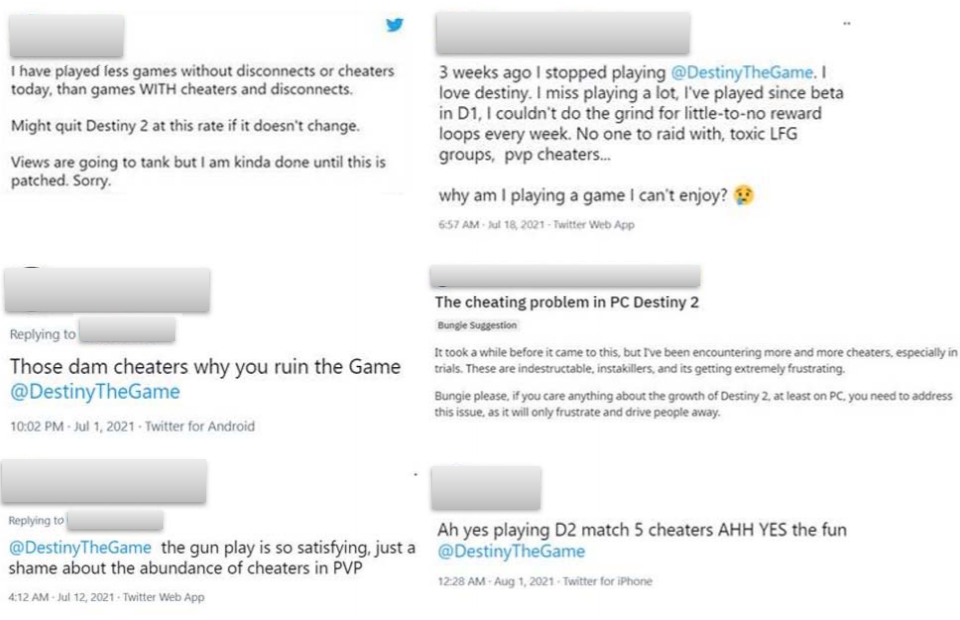[Most Recent Entries] [Calendar View]
Friday, August 20th, 2021
| Time | Event |
| 10:49a | Bungie Sues Elite Tech Boss, Lavicheats & VeteranCheats For Copyright Infringement
Last month the company filed a lawsuit in a California district court targeting people behind the Ring-1 cheating operation and in a Washington court yesterday, filed three more lawsuits targeting three additional cheat distributors. Bungie vs. Elite Boss TechAccording to the complaint, Elite Boss Tech and 11020781 Canada Inc. are Canadian corporations operating out of Montreal, Quebec, and are both involved in the Wallahx.com website, with the former acting as operator and the latter handling payments and finances.  Bungie says defendant Daniel Fagerberg Larsen (aka ‘Gokke’) lives in Denmark and is an owner of the Wallhax site, Elite Boss Tech, and 110 Canada. Robert James Duthie Nelson of Canada is said to be an owner of the same entities. Several other individuals are listed as John Does since Bungie doesn’t yet know their true identities. It lists their online handles, roles and presumed locations as follows: Slytiger (Wallhax admin, customer service), Badger (developer/coder), Luzypher (customer support/moderator, Netherlands), GoodMan (reseller, China), Yimosecai (cheat seller, China), Riddell (moderator, Wallhax business operator), piskubi93 (reseller, China). The Wallhax cheat (available from defendants’ websites Wallhax.com, ArtificialSensei.com, SecureAC.io, SecureCheat.xyz, SecureCheats.net, CODHax.com, GainOSaurusHax.com, CryptoCheats.com, and PrivateCheatz.com) consists of two components – the ‘ESP Hack’ and the ‘Aimbot’, both of which provide players with a competitive advantage by circumventing Bungie’s cheat detection measures. Sometime in June, the Destiny 2 cheat was removed from the Wallhax cheat status page and the term ‘Destiny 2’ was added to the forum’s profanity filter. However, Bungie says the cheat is still available. Bungie says the defendants infringed its rights in multiple ways. They released ‘sizzle reels’ to market the cheat using Destiny 2 artwork and developed software to hook into copyrighted Destiny 2 code thereby producing an unlicensed derivate work. They illegally downloaded Destiny 2 in violation of the company’s licensing terms and willfully distributed copyright infringing code. Bungie further alleges that the defendants derived income from racketeering activity and obtained property from Bungie under false or fraudulent pretenses and committed criminal copyright infringement. The defendants therefore laundered money in connection with their cheat sales. In addition, Bungie alleges the defendants circumvented technological protection measures under the DMCA, violated the Computer Fraud and Abuse Act and by breaching Bungie’s licensing terms, are liable for breach of contract. Bungie alleges that the defendants interfered with the contractual relationships between the developer and its customers, violated the Washington Consumer Protection Act, and engaged in a civil conspiracy. Bungie requests an injunction, a destruction order, and millions in damages. The complaint can be found here (pdf) Bungie vs. Kunsal Bansal (Lavicheats.com)The second complaint filed in Washington targets defendant Kunsal Bansal (aka Lavi) who is said to reside in Bathinda, India. He is the reported operator of Lavicheats.com. The complaint also lists three John Does, identified only by their online handles and roles – Maximus, Alfred/ShaktiMaan, and Eivor/Oracle – all of whom provide cheat support and in two cases, promote the cheats on other platforms. “In addition to cheats or hacks for Destiny 2, Defendants offer cheating software for use in connection with numerous other games from other game developers, including but not limited to Apex Legends, Overwatch, Call of Duty, Rainbow Six, League of Legends, Fortnite, Rust, and Valorant,” the complaint reads. According to Bungie, Lavicheats’ software gives players a competitive advantage by offering an ‘aimbot’ and tools that provide extra ammo and other features. The developer says the defendants trafficked in circumvention devices contrary to the DMCA and committed contributory copyright infringement by intentionally inducing the direct infringement of Lavicheat users who “copy, reproduce, adapt, and/or create derivative works from Bungie’s copyrighted works” when they install and use the cheat software. The complaint further alleges vicarious copyright infringement because the defendants have the ability to curtail cheat users’ infringing activities but refuse to take the necessary steps. Finally, Bungie alleges trademark infringement and unfair competition related to the unlicensed use of Destiny marks, violation of the Washington Consumer Protection Act, interference with contractual relationships, and unjust enrichment at Bungie’s expense. Again, the developer demands an injunction, the destruction of all technology in breach of the DMCA, and millions in damages. The complaint can be found here (pdf) Bungie vs. VeteranCheats.comThe final complaint targets VeteranCheats.com and several John Does identified by their online handles – website owner Blaze, Knorr, and John McBerg. They are collectively accused of developing, selling and distributing cheats for Destiny 2 that give players a competitive advantage via use of an ‘aimbot’ and other tools to provide unlimited ammunition and unlimited lives. This activity has a detrimental effect on legitimate players of Destiny who complained that the cheats ruined the game to the point that they considered abandoning the game or actually did so.  Bungie’s claims of copyright infringement center around the defendants’ copying or reproducing Destiny 2, reproducing its artwork, and creating derivative works, including by modifying Destiny 2’s performance and screen displays. “Defendants’ users also infringe Bungie’s copyrights when using the VeteranCheats Software to create derivative works, including by modifying Destiny 2’s performance and screen displays for themselves, in streams transmitted and uploaded through third-party services, and for other players who interact with them in both PvE and PvP modes. Defendants are liable for inducing and contributing to such infringing acts,” the complaint adds. In common with the other two lawsuits filed yesterday, Bungie alleges circumvention of technological measures under the DMCA, trafficking in circumvention devices, breach of contract, tortious interference, and violation of the Washington Consumer Protection Act. The developer further demands an injunction, the destruction of all technology in breach of the DMCA, and millions in damages. The complaint can be found here (pdf) From: TF, for the latest news on copyright battles, piracy and more. |
| 8:42p | Promoting Popcorn Time Piracy Costs Phone Store Employee Her Job and $6,250
This is a problem for copyright holders, which have tried to tackle the problem in recent years, both in and outside of court. Hawaiian attorney Kerry Culpepper has been particularly active on the legal front. Representing a variety of movie companies, he has gone after users, site operators, and developers connected to Popcorn Time, Showbox, and other apps. These legal efforts have also spilled over to more indirect targets such as Internet providers and VPN services. Even offline targets aren’t safe it seems. Last December, a former employee of a VICTRA store was sue for promoting the piracy app Popcorn Time to customers. VICTRA Employee Promoted Popcorn TimeThe lawsuit was filed on behalf of the makers of the film ‘Hunter Killer’, which was later joined by four other movie companies. The filmmakers accused Ms. Boylan of downloading several films. More unusually, the rightsholders also accused her of promoting Popcorn Time to customers at the VICTRA store “Defendant promoted the movie piracy applications to her customers to entice them to purchase particular products and thereby increase her own compensation,” the amended complaint read. The claim was backed up by testimony from a VICTRA customer who stated that Ms. Boylan recommended and helped him to install Popcorn Time to watch free movies. This customer was sued in an earlier lawsuit and likely provided the information as part of a settlement. After the customer pointed out Ms. Boylan the filmmakers did some further research which showed that the IP-address connected to her Verizon subscription had been repeatedly used to download pirated movies. Filmmakers Demand $162,500When VICTRA found out about the allegations, Ms. Boylan was terminated as an employee. However, the movie studios were not done yet and also demanded a large sum in piracy damages. After Ms. Boylan failed to respond in court, the filmmakers requested a default judgment asking for $150,000 in copyright infringement damages and another $12,550 for violations of the DMCA. In a recent order, U.S. District Court Judge Frank Montalvo agrees that the copyright holders are entitled to damages. However, the demands are too high and the final verdict is substantially lower. “Several factors suggest a somewhat lower award of statutory damages,” Judge Montalvo writes, adding that “the facts do not establish Defendant’s direct infringement extended beyond personal consumption.” Ms. Boylan’s downloads for personal use are not the biggest issue, according to the court. What weighs stronger is that the defendant promoted Popcorn Time in a sales pitch, for her own benefit. $6,250 Will SufficeAll in all, however, the court doesn’t believe that the movie companies were substantially harmed by any of these activities. “Defendant’s contributory infringement is somewhat more serious as it likely caused more lost revenue than her direct infringement and was done for her own profit. Even so, the total harm to Plaintiffs is unlikely to be substantial,” the order reads. Instead of the requested $162,500 in damages, the court rules that $6,250 is sufficient in this matter. An additional award of $10,680 in attorney’s fees and costs brings the total due to $16,930. The significantly reduced damages amount saves the defendant from potential lifelong debt. However, Judge Montalvo stresses that the amount is probably high enough for her to learn a lesson. — A copy of the order issued by U.S. District Court Judge Frank Montalvo is available here (pdf) From: TF, for the latest news on copyright battles, piracy and more. |
| << Previous Day |
2021/08/20 [Calendar] |
Next Day >> |

 Millions of people around the world use pirate apps on their mobile devices to stream TV-shows and movies.
Millions of people around the world use pirate apps on their mobile devices to stream TV-shows and movies.